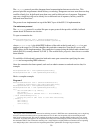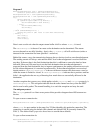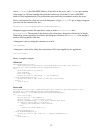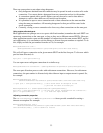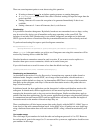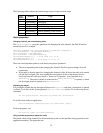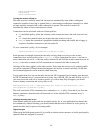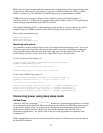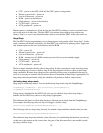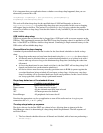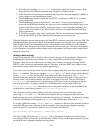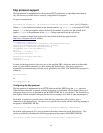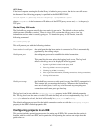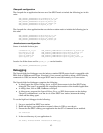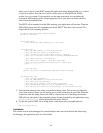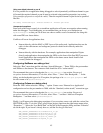38
• CPU – power on but CPU clock off (the CPU's power saving mode)
• Master system clocks – power on
•
Low level firmware – power on
• RAM – power on but inactive
• Flash memory – power on but inactive
•
CC2420 radio – power on
• AT91 peripherals – power on
Because power is maintained to all the devices the Sun SPOT continues to react to external events
such as the arrival of radio data. The Sun SPOT also resumes from shallow sleep without any
latency. That is, as soon as any thread becomes ready to run, the Sun SPOT wakes and carries on.
Deep Sleep
The Sun SPOT can be programming to use a deeper power-saving mode called “deep sleep”. In this
mode, whenever all threads are inactive, the Sun SPOT can switch off its primary power supply and
only maintain power to the low level firmware and the RAM.
• CPU – power off
• Master system clocks – power off
•
Low level firmware – power on
• RAM – main power off, RAM contents preserved by low power standby supply
• Flash memory – power off
•
CC2420 radio – power off
• AT91 peripherals – power off
The Java thread scheduler decides when to deep sleep. It takes some time to wake from deep sleep,
so the scheduler may choose to shallow sleep if the sleep duration will be too short to make deep
sleep worthwhile. Because deep sleep involves switching off the power to peripherals that may be
active it is necessary to interact with the device drivers to determine if deep sleep is appropriate. If a
deep sleep cannot be performed safely the scheduler will perform a shallow sleep instead.
Activating deep sleep mode
Deep sleep is enabled by default. You can disable deep sleep mode using the SleepManager:
ISleepManager sleepManager = Spot.getInstance().getSleepManager();
sleepManager.disableDeepSleep();
If deep sleep is disabled the Sun SPOT will only ever use shallow sleep. Once deep sleep is
enabled, the Sun SPOT may choose to deep sleep if appropriate.
The minimum idle time for which deep sleeping is allowed can be found from the SleepManager.
For example, the following code can only ever trigger a shallow sleep:
Thread.sleep(sleepManager.getMinimumDeepSleepTime() – 1);
The following code may deep sleep, but only if a number of preconditions (detailed later) are met:
Thread.sleep(sleepManager.getMinimumDeepSleepTime());
The minimum deep sleep time includes a time allowance for reinitializing the hardware on wake up
so that user code resumes at the correct time. Any part of the allowance that is not needed is made
up using a shallow sleep.



